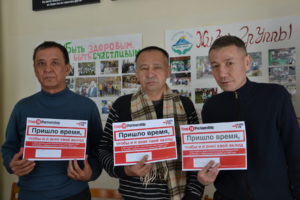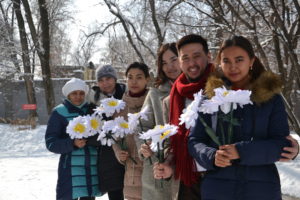 People affected with tuberculosis desperately need support and understanding of the society during this difficult period of their lives. However, often they are left alone with their problem, which leads to low adherence to treatment and high dropout rates.
People affected with tuberculosis desperately need support and understanding of the society during this difficult period of their lives. However, often they are left alone with their problem, which leads to low adherence to treatment and high dropout rates.
Roza Idrisova, Director of the first and only patient organization in Kazakhstan, protecting the rights and interests of people affected with tuberculosis – Sanat Alemi – admits that her motivation to work in this sphere was a strong desire to improve the quality of life for people with tuberculosis while they are on treatment. In 2016, it started implementing the project “Improving TB/HIV Prevention & Care – Building Models for the Future”, which became possible thanks to the support of AFEW Kazakhstan.
When a person faces a serious disease, it may seem that the whole world is ruined. How is it possible not to break down in such a situation?
Yes, really, when people hear about their diagnosis for the first time, they are terrified and scared for their own health and the health of their loved ones. At this moment, it is very important to give such person more information about TB, explain that this disease is curable. It is also crucial to give him or her a chance to talk to people who survived TB. The fact is that lack of knowledge causes fear and fear of TB leads to stigma – and that is the main thing we need to fight to end tuberculosis. We aim a lot of our efforts at countering this problem. All our activities contribute to reduced stigma and increased adherence to treatment, better awareness of TB in society, etc. We were the first to organize support groups for patients with TB. Besides, a patient council with five members was founded. Patients are the ones who identify and approve the lists of those in difficult circumstances who most need social benefits offered by the project we currently implement. When patients take part in support groups, they want to not only solve their own issues but also help others. Communication is the biggest component of such support groups. It is vital for the participants to be heard, to share their experience, thoughts and emotions and help other members of the group to deal with their issues and find ways to resolve them. Support groups are aimed at the participants understanding and protecting their rights and interests, attracting the attention of society and government agencies to their issue and fighting for the changes in public opinion and state policies.
What is the most memorable story from your practice?
As an example, I would like to tell about one of our patients. Marzhan Seytimova, 40 years old, mother of three, working in health care area not related to TB. When she learned about her diagnosis, she was shocked and felt panicked, as she was afraid for the health of her children and husband. Fortunately, they were healthy. However, she had a strong self-stigma. Children treated her diagnosis with understanding, but the story with her husband was different. She faced a lot of misunderstanding and aggression from the side of her husband, who refused to understand and accept her with this diagnosis. When Marzhan’s doctor insisted that she came to our organization, she was very frustrated, depressed and had suicidal thoughts. After counselling sessions, she totally changed. She was interested in life again and felt positive about her treatment and cure. The most important thing was working with her husband. We managed to change his attitude to his wife. Today Marzhan is healthy, she continues to work and lives happily with her children and husband who love her. She is doing great!
Disease brings people together – is it true?
I agree with you, it really does. For instance, I would like to tell you a story of our patient, who told us how he was able to find true friends thanks to his disease. When he was 22, he was diagnosed with infiltrative tuberculosis of the superior lobe of his right lung. Once his fellow students learned about his disease, they limited their communication with him. While in hospital, he met other young people with the same diagnoses. They supported each other and met in the evening to sing songs and tell funny stories. After he was released from hospital, they continued their interaction, initiated a messenger chat and started doing sports together – they grew to become a real family.
How can we persuade the society to be more tolerant towards people with severe diseases?
 This task requires a lot of effort to raise the awareness. All government and non-government stakeholders involved in TB response should conduct awareness-raising activities. For instance, contests can be initiated for the journalists to publish articles dedicated to the topic of TB. Such publications should be aimed at reducing social stigma against people with tuberculosis, fighting false stereotypes and discrimination, and forming tolerance in the society towards people affected with TB. There should be videos in mass media to inform people that tuberculosis is curable and that there is no need to be panicked about it and to call people to be tolerant to those who got sick. We do a lot in this area: our patients take part in press conferences, make videos demonstrating their own successes in fighting this disease, give interviews with open faces, etc. Every year, patients from support groups hold various campaigns dedicated to the World TB Day. In 2016, a flash mob was organized in Almaty by the patients from support groups. In 2017, we held a charitable fair “Let’s Help” to sell the things hand made by patients. In 2019, within the month dedicated to the World TB Day, Sanat Alemi organized a campaign to raise the awareness about tuberculosis “Healthy Individual – Healthy Society” in Almaty public transport. Over 800 leaflets with information on TB were distributed among the passengers. When we initiated this campaign, we could not even imagine that people in public transport would be so active and that this event turns out so great.
This task requires a lot of effort to raise the awareness. All government and non-government stakeholders involved in TB response should conduct awareness-raising activities. For instance, contests can be initiated for the journalists to publish articles dedicated to the topic of TB. Such publications should be aimed at reducing social stigma against people with tuberculosis, fighting false stereotypes and discrimination, and forming tolerance in the society towards people affected with TB. There should be videos in mass media to inform people that tuberculosis is curable and that there is no need to be panicked about it and to call people to be tolerant to those who got sick. We do a lot in this area: our patients take part in press conferences, make videos demonstrating their own successes in fighting this disease, give interviews with open faces, etc. Every year, patients from support groups hold various campaigns dedicated to the World TB Day. In 2016, a flash mob was organized in Almaty by the patients from support groups. In 2017, we held a charitable fair “Let’s Help” to sell the things hand made by patients. In 2019, within the month dedicated to the World TB Day, Sanat Alemi organized a campaign to raise the awareness about tuberculosis “Healthy Individual – Healthy Society” in Almaty public transport. Over 800 leaflets with information on TB were distributed among the passengers. When we initiated this campaign, we could not even imagine that people in public transport would be so active and that this event turns out so great.




